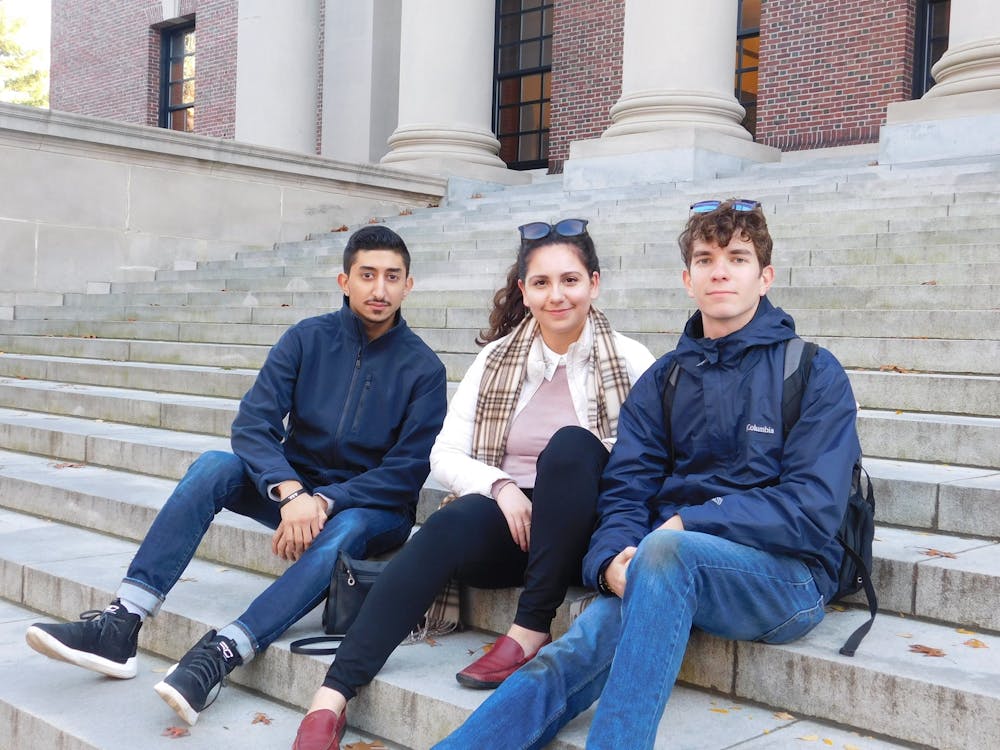Savannah Del Cid really wants a job that does not exist ... yet.
Del Cid, a junior, wants to work in synthetic biology, a relatively new but rapidly growing field that is focused on redesigning the building blocks of organisms and engineering them to have new abilities and characteristics.
“The essence of synthetic biology is getting, almost like LEGO brick pieces together and building a new system,” Del Cid explained.
She, along with fellow juniors Garrett Lang and Majd Aboul Hosn and sophomore Loreto Malinowski, traveled to Boston from Oct. 31 to Nov. 4 to compete in the International Genetically Engineered Machine (iGEM) Competition, a global competition that draws thousands of students world-wide who work on projects in the field of synthetic biology.
The 2019 iGEM Giant Jamboree, the final competition, fielded close to 350 teams from across the globe, even from countries as far-flung as New Zealand and Kazakhstan.
The four students who presented at the competition, along with sophomore Chandler Barrett, juniors Jajsani Roane and Addison Swackhammer and seniors Sofía Bustamante and Maxim Ohairwe Ermoshkin comprised UR’s iGEM team, which was advised by biology professor B. Daniel Pierce.
“I was approached by Savannah Del Cid two years ago, and she was really excited and interested about iGEM,” Pierce said. “Since she was a young student and would be able to see the project through, because it is quite a commitment, I agreed to be the faculty adviser for it.”
Because iGEM operates on a calendar-year schedule, work on this year’s project started last spring semester, in January, Del Cid said.
The team members decided to base their project on research Pierce was already doing, Pierce said, and focused on the plant pathogen Agrobacterium, which causes a disease in plants called crown gall disease.
Del Cid described the team’s project as “trying to build up immunity in plants with synthetic biology and delivering it, via bacteria, to the plant.”
It was a challenge, especially since no one on the team had ever competed in something of this scale before.
“Many of these teams have upwards of 20 undergraduates working on it, and since this was a new program for the University of Richmond, it required some more ramping up of things,” Pierce said.
Enjoy what you're reading?
Signup for our newsletter
To prepare for competition, the team members had to make a poster, prepare a presentation and set up a website about their topic.
“It’s almost like this is already a mini start-up, right?” Del Cid said. “Because you got to get all those pieces together.”
Once their project was completed, select members of the team headed to Boston, where they presented their project, attended workshops and networked with other teams, Lang said.
They are still waiting for their final results, but Lang, Del Cid and Pierce are all proud of the work they have done.
“Maybe even if we didn’t come to a final product necessarily, still some of the stuff we did people are impressed with, and wanted to expand upon,” Del Cid said. “So that was really cool.”
The team members and their adviser expect iGEM to grow at UR in the long term, they said.
“The opportunities that we have here at Richmond would be wonderful for a future with iGEM,” Pierce said, explaining how future UR iGEM teams could collaborate across disciplines.
Perhaps teams could draw in business students to help with marketing and fundraising or work with students in other science departments in order to broaden the applications of future projects, Pierce said.
“When you can do that, you can really build a project that is really powerful for the whole community,” he said.
Contact contributor Aquila Maliyekkal at aquila.maliyekkal@richmond.edu.
Support independent student media
You can make a tax-deductible donation by clicking the button below, which takes you to our secure PayPal account. The page is set up to receive contributions in whatever amount you designate. We look forward to using the money we raise to further our mission of providing honest and accurate information to students, faculty, staff, alumni and others in the general public.
Donate Now



